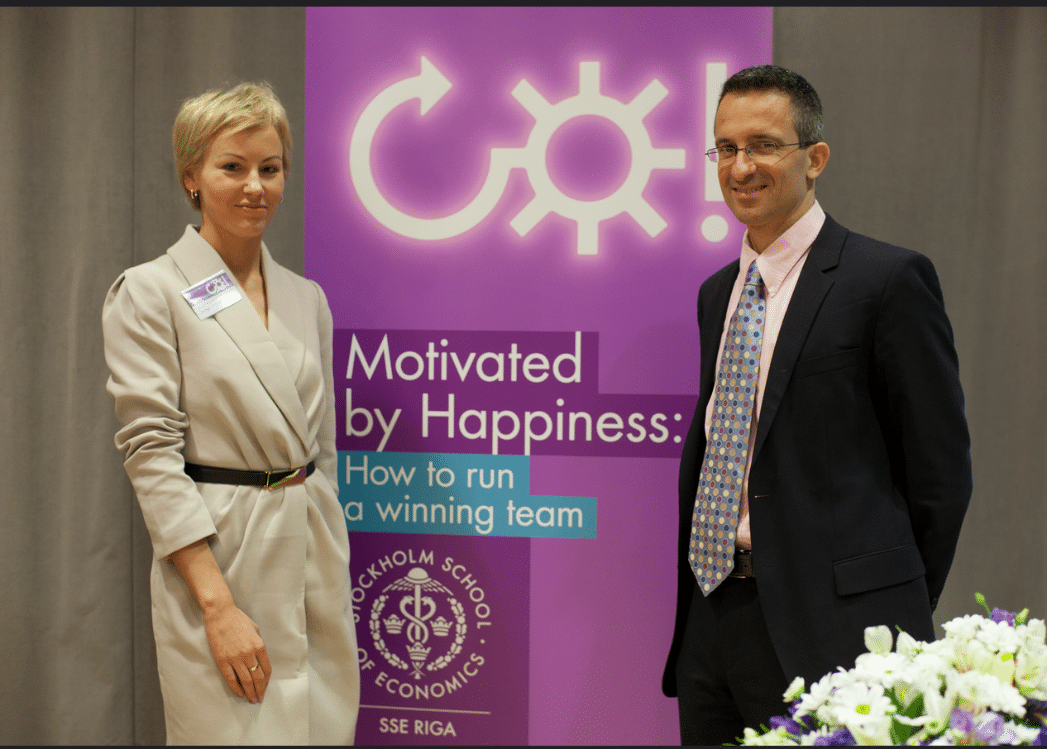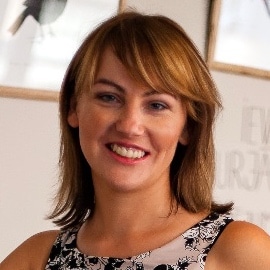by Anda Klavina
In the photo on this page, you can see me some years ago with WBI cofounder Tal Ben-Shahar. At that time, I was working at the Stockholm School of Economics (SSE Riga) in Riga, Latvia, in the Executive Education department. I was responsible for marketing and selling programs for executives, as well as often composing them.
We needed to do a special event for our clients, to thank them for their loyalty by introducing them to a current leadership topic. I was searching for interesting speakers on YouTube and accidentally came across Tal’s talks. He was using combinations of words that were unheard of for me at that time: “happy employees” and “happy company,” and talking about how happiness increases revenue. It all sounded bizzare enough for me to inquire if Tal would be willing to come to Riga. He was! He would join speakers at the event from IMD Business School, Silicon Valley, and others.
January came—the event was planned for early March—and people started to register: one, one more, another one, a couple more, three, five, 10, another 10, yet another 10 … The conference hall was filling up so quickly that I literally had to stop the registration. I remember a partner from one of the Big 4 companies phoning me: “Please allow me to come. I will take my own portable chair with me. I really want to hear this talk.” As you can imagine the event was a success.
During the conference day, I had lunch with my colleagues. One of them said to me: “Isn’t it strange? You have organized a conference about happiness, but you don’t look particularly happy yourself today.” I paid attention to these words. I went to the bathroom, looked at myself in the mirror, and said: “At this point, forget about the clients, forget about business, take something for yourself from this event.”
Tal spoke in the second part of the event, and he talked about how to understand if you have chosen the right career path. He was saying, “Ask yourself if you would do it if you weren’t paid for it? And then ask yourself: Would you still do it even if nobody knew you were doing it?”
I scanned my career at that moment with my mind’s eye, and realized I was partly fullfilling my mission. Ever since I can remember, I have loved to unite people for some kind of self-development experience, be it a visit to an art exhibition with my younger sisters during school, or this cutting-edge leadership program for executives at SSE Riga. But I also immediately recognized what I was missing. I realized what I enjoyed the most was the focus on the individual—their talents, strengths, and excellence—not so much general strategy, marketing, or finance, where the main focus is the business organization’s system as a whole. For I had seen that sometimes those cutting-edge trainings that companies invest big money in are conducted partly in vain, because leaders have not yet found their own personal leadership—discovered their psychological patterns, clarified their own values, and honed their personal vision.
During Tal’s speech, I made a decision that I would create my own company, working in the field of personal development for businesspeople. Little did I know that it was the beginning of major self-discovery for myself, too.
During the next six months, I had a vision, a strategy, and a plan for my company but, most importantly, I was ready to take a risk to follow the gut feeling that said, “Go out in the world!” And I embarked on the journey called Anda Klavina Consultancy, Ltd. As you can imagine, positive psychology become the core of my training offerings. I cooperate with positive psychology trainers from all over the world: Process Work Institute in Portland, University of Sydney, University of Latvia. I also cooperate with European and American trainers and coaches on topics including intuition, body trauma healing, transformative leadership, and complementary business topics like storytelling and personal branding.
While setting up my company and working with various trainers, I became increasingly aware of my personal strengths—appreciation of beauty and excellence, love, humor, hope, zest, and curiosity. To sustain perseverance in the face of challenges, to follow the vision in moments of doubt, required that I rely more and more on my top strengths. In the moments when I feel the energy coming from my core, my faith (yes, you need it as an enterpreneur working in a relatively new field in a region with decreasing population numbers) renews and my belief that my attempts are worthwhile solidifies. This awareness prompted me to take WBI’s online Strengths-Based Coaching course, and gradually get involved in coaching myself.
With entrepreneurial culture booming and autonomization of employees increasing, the momentum here is great for a strengths-based approach and for positive psychology in general. There’s still some catching up to do in the Baltic states, but we will soon be there. Most of my loyal customers are people who are inspired by my personal strengths-based lifestyle. I encourge them to connect with their innate potential and lust for life. It is particularly important in this region, where the shadow of an oppressive culture is still felt. One of my favorite testimonials indicates that my quality of zest is working: “You inspire me to dream big and realize those dreams.”
Anda Klavina is a positive psychology practicioner and art consultant operating in Riga, Monte-Carlo, Basel, and around the globe. leaderswithguts.lv.










